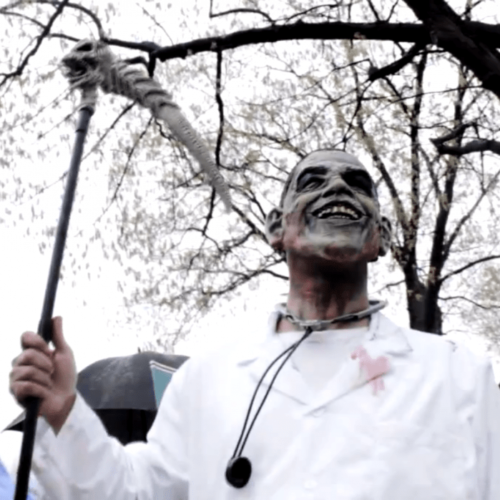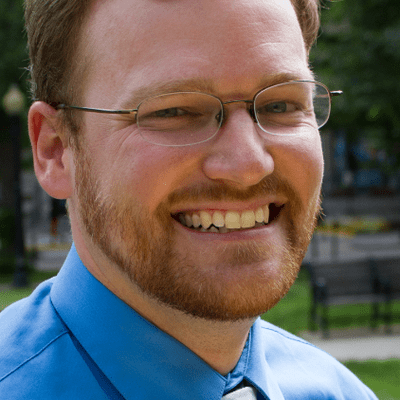Introduction
A former supporter of President Barack Obama, angered by Obama’s signature health insurance overhaul, wants to turn the election season into a horror movie with the aid of a super PAC.
Last week, Glenn Morton, a 41-year-old health insurance broker and failed congressional candidate who lives in a Maryland suburb of Washington, D.C., launched a low-budget super PAC called “Occupy Obamacare.” The group’s nascent YouTube channel features “Dr. Obamacare” wearing a zombie mask and carrying a scythe with a skull. (Dr. Obamacare also has his own Twitter feed.)
Apparently, the Obama zombie is meant to be a physical manifestation of Obama’s Affordable Care Act.
In one video, Dr. Obamacare appears in a dark tunnel and warns “If you don’t do as I prescribe, I’ll be extracting the maximum penalty” — before repeatedly slashing with his scythe.
In another, the zombie Dr. Obamacare appears at a tea party rally wearing a bloody white coat and summons a bolt of lightning to strike down former GOP presidential candidate Herman Cain as he urges the crowd to repeal the president’s health care plan.
“I’m going to run a whole campaign around this one law because I know I have a better solution,” Morton told iWatch News.
Morton’s super PAC will never be confused with the big guns that have attracted tens of millions of dollars, like the pro-Mitt Romney Restore Our Future and Karl Rove’s American Crossroads. So far, he hasn’t bought any advertising to feature his creation and he declined to say how much the group has raised. The videos are apparently largely self-financed.
But whether you agree with his message or not, the videos are an argument that the super PACs can be an outlet for creative political speech, made possible in part by the liberalization of campaign finance laws.
Morton plans on releasing a new video starring Dr. Obamacare every two to three weeks, culminating with a capstone video on Halloween — which falls less than a week before Election Day. He says that finale will be “bigger than ‘Thriller,’” Michael Jackson’s zombie film that was released in 1983.
“‘Thriller’ was so interruptive that everyone had to watch it,” Morton said, adding that it’s human nature to stop and stare at shocking movies and events, such as traffic accidents, that disrupt people’s daily norm. “That’s exactly what I plan on bringing people.”
While the super PAC may produce disturbing videos, what Morton really wants to talk about is health care.
He says he’s frustrated that neither candidate on the top of the ticket this fall will be making the case for “real” health insurance reform. In Morton’s view, both Obama’s health insurance reform and Republican presidential hopeful Mitt Romney’s law in Massachusetts are designed to take money from people, via the individual mandate, and dole it out to insurance companies.
“I was a pretty consistent Democratic vote until Obamacare,” said Morton, who freely admits that he voted for Obama in 2008. “But by the time I was done reading the bill, I was a Republican.”
The super PAC is just the latest tool Morton is using to draw attention to his cause.
Last year, he published a book outlining his ideas for increasing access to affordable health care. And days before he officially filed paperwork with the Federal Election Commission to register his super PAC, he placed third — among three candidates — vying for the GOP nomination in Maryland’s 5th Congressional District. (Had he won, he’d be running against House Democratic Whip Steny Hoyer.)
During his unsuccessful congressional campaign, he neither raised nor spent more than $5,000 — the FEC’s threshold for registering as a candidate and filing campaign finance reports.
So far, Morton’s videos have attracted a relatively small audience thus far, but if enough people see it, he might attract enough cash to start a movement.
“If you pick the right cause, you can attract a lot of money,” said Matthew Crenson, professor emeritus of political science at Johns Hopkins University. “If it does go viral, he’s got it made.”
A wave of super PACs formed following the Supreme Court’s Citizens United decision and a lower court ruling. They are permitted to collect unlimited contributions from individuals, corporations and unions in the wake of federal court rulings in 2010. But the vast majority are low- or no-budget operations.
“Simply filing the form [to register a super PAC] is something hundreds have done,” said Anthony Corrado, a campaign finance expert at the Brookings Institution, a Washington think tank. “The key is either finding a wealthy supporter to back the cause or being able to attract a broad base of support to raise a substantial amount of money.”
Regardless of Morton’s ability to attract cash to his cause, he’s at least earning accolades from proponents of super PACs, who say groups like Morton’s increase the amount of speech and ideas in public discourse.
“I don’t know how far he’ll be able to get,” said David Keating, the president of the Center for Competitive Politics, which advocates for First Amendment political rights. “But it’s good that he’s able to try.”
Read more in Money and Democracy
Money and Democracy
Beer and wine wholesalers behind legislators pushing controversial voter ID laws
Industries backing the American Legislative Exchange Council facing new scrutiny


Join the conversation
Show Comments